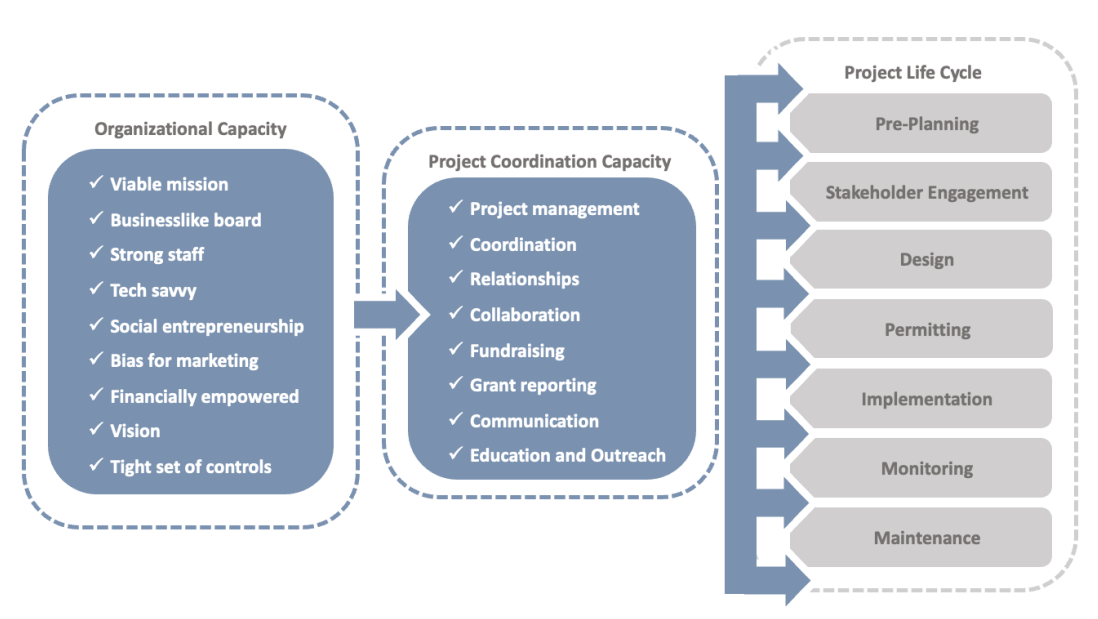Scaling Up Local Capacity for Multi-Benefit Watershed Projects
What kinds of support do small, rural organizations need to lead multi-benefit watershed projects? It varies, but the need for additional capacity support to lead these projects is huge, and River Network and our partners in Colorado are coordinating to deliver that support.
What Are Multi-Benefit Projects?
These are river/watershed protection, conservation, and enhancement projects with beneficial outcomes for multiple water use interests (agriculture, municipal, recreational, environmental).
These projects involve many steps: pre-planning, stakeholder engagement, and project design and permitting. Once these steps are underway, the next steps include project implementation, monitoring, and maintenance.
Foundational to successful implementation of this “project life cycle” is strong organizational capacity combined with project coordination capacity (Figure 1). Strong organizational capacity is characterized by:
- Clear mission and goals,
- Supportive board of directors,
- Knowledgeable and trusted staff, and
- Financial empowerment/stability.
Project coordination capacity refers to the specific capacity needs for managing and implementing multi-benefit projects. Project coordination builds on strong organizational capacity and includes capacity for project management, stakeholder coordination, relationship building, collaboration, fundraising (e.g., grant writing), grant reporting, communications, education, and outreach.
Conceptual model of how “local capacity” (organizational and project coordination capacity) support all aspects of a project life cycle. Adapted from (Brickerhoff, 2000; Blazewicz, Jagt, & Sickles, 2019).

Barriers to Success
Small, rural organizations often struggle to achieve and maintain the level of capacity needed to pursue projects, multi-benefit or otherwise. Rural communities face greater rates of poverty and smaller tax bases than urban communities. This results in limited resources available, limited labor force due to population decline, and lower wages.
In addition, philanthropic giving reports show that environmental investments consistently lag other causes, that rural communities, with few exceptions receive less funding than urban areas, and Tribes are severely underfunded as compared to non-Tribal communities. These structural issues with philanthropy exacerbate the capacity challenges that rural communities face including their ability to access funding and increased competition for limited resources.
What We Learned
River Network has been hearing about these capacity challenges since we began supporting organizations that lead Stream Management Plans back in 2017. In 2020, we took action and launched a pilot program to provide rural, agricultural organizations in two Colorado river basins (Yampa and Mancos) with resources to increase the quantity and quality of multi-benefit projects on private lands. (read more about the program).
The pilot program wrapped up in 2023, and River Network documented the lessons learned from the program in our white paper Scaling Up Local Capacity for Multi-Benefit Projects throughout Colorado (read the executive summary). In a nutshell, we learned:
- There are not enough local capacity investments available to support organizations that lead multi-benefit projects,
- Organizations with reliable, permanent funding demonstrate increased success in implementing projects and leveraging federal funding,
- A team approach, whether within an organization or among organizations, fosters resilience and increases creativity which benefits success through drawing upon multiple skill sets,
- Community support through planning, place-based collaboratives, funding navigation/assistance, helps advance capacity building of small, rural organizations, and
- Statewide nonprofit organizations (like River Network) are most helpful when they play a supportive role through providing technical assistance, fostering access to alternative funding mechanisms, and cultivating access to their networks to help advance policy and other support initiatives.
What’s Next?
River Network is working with our partners to use these lessons learned to advance conditions and frameworks for successful multi-benefit project implementation throughout Colorado. We are facilitating a peer group composed of Colorado’s “capacity builders”- large NGOs, funders, land trusts, etc. – to coordinate our efforts and dig in on how we can better address equity considerations in our work.
Whether it’s providing guidance on how to conduct meaningful outreach to landowners or increasing local knowledge of available funding sources, there is much to do to help rural, low capacity communities advance multi-benefit projects. River Network is committed to delivering that support with our partners, and sharing what we learn as we go.
Additional Resources
- Capacity funding navigator by River Network and the Urban Waters Federal Partnership
- Building formal collaboratives to leverage federal funding





